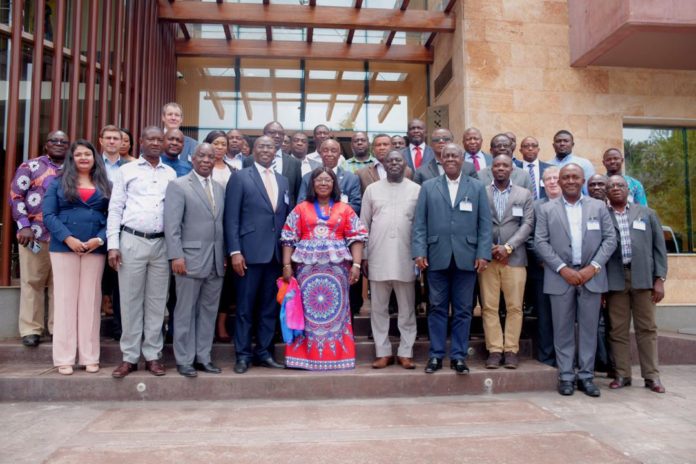
The Chief of Staff Frema Akosua Osei Opare officially opened a stakeholder workshop organized by the Ghana Integrated Aluminium Development Corporation, GIADEC at Aburi on 1st of October 2, 2019.
The Stakeholders’ Workshop, is being organized to bring all government agencies and regulatory bodies that have a significant role to play in shaping key aspects – railways, ports, roads, competitive long-term power, and more – the vital components that will together underpin the outline master plan for Ghana’s Integrated Aluminium Industry.
The purpose of the three day meeting is to discuss the varied environmental and community engagement issues that would need to be addressed to ensure successful execution of the programme in line with responsible mining principles.
The Agencies and Corporations represented included; Ghana Railway Development Authority, Ghana Ports and Harbours Authority, Energy Commission, and Ghana Gas Company.
VALCO and Ghana Bauxite Company, which are now operating as part of GIADEC, were also represented at the workshop.
Others present were Environmental Protection Agency, Water Resources Commission and Forestry Commission, as well as representatives from the impacted mining communities, ensuring on-going engagement with the statutory agencies as well as the community representatives.
Addressing the opening ceremony, the Chief of Staff, Hon Mrs. Akosua Frema Osei Opare emphasized government’s commitment to prioritize the GIADEC agenda and assured all stakeholders that mining in the selected bauxite reserves will be carried out with very strict adherence to internationally accepted mining codes and principles.
She indicated that Government’s agenda to develop an Aluminium Industry is anticipated to contribute significantly to the Ghanaian economy, which will inure to the benefit of all Ghanaians.
According to the Chief of Staff, “As a Country with an estimated bauxite reserve of about 900 million tonnes, large natural gas reserves to power our industries, an existing smelter, expanded ports as well as significant quantities of industrial salt, the stage is set for Ghana to position itself to develop a resilient integrated aluminium industry that will create thousands of jobs, contribute about $10 billion in economic output annually, attract foreign direct investments, support the economic case for the development of significant infrastructure in the country and develop the foundation for an industrialised economy”.
The Chief Executive Officer, Michael Ansah in an address posited, that, the workshop forms part of a process intended to engage with representatives of the core set of GoGrelated entities who may play respective roles throughout this strategic project.
He emphasized that, the Corporation is on course to execute on its mandate of promoting and developing a globally competitive Integrated Aluminium Industry in Ghana. Commenting on the Corporations activities thus far, he confirmed, GIADEC was engaged in a process of selecting a partner through its investor engagement rounds and also developing strategies that will ensure the interest of all stakeholders, including key communities that will be impacted through mining and allied activities are taken care off.
Mr. Ansah reiterated that, GIADEC would continue to collaborate and deepen its engagements with the bauxite mining communities and other stakeholders, including Civil-Society Organizations, guided by globally accepted best practice and standards to ensure a responsible and sustainable Integrated Aluminium Industry in Ghana.
The bauxite reserve currently being considered for mining is estimated to be in the region of 900 million metric tons (MT), across the three bauxite reserves in Ghana. Nyinahin, Kibi and Awaso.
The opening session was also attended by Hon. Benito Owusu Bio, Deputy Minister, Lands and Natural Resources, and a member of the GIADEC Board, who delivered the welcome address. In his remarks, the deputy minister thanked participants for their engagement with GIADEC. He also underscored the importance of this meeting, and how the output from the discussions will be important in defining the infrastructure as well as the environmental framework for developing Ghana’s Integrated Aluminium industry.
Source: Ghana/Starrfm.com.gh/103.5FM

